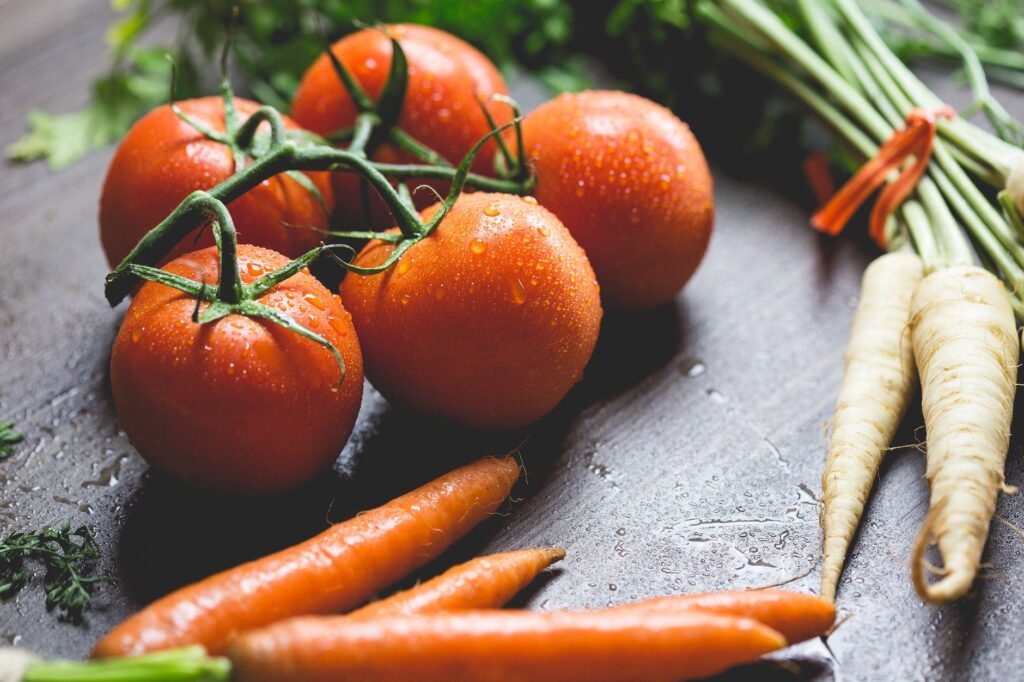Carbs, just like every other macronutrient, have a place in improving your body composition. In the case of PCOS, more lean muscle mass supports insulin sensitivity, fat-burning, and lessening PCOS symptoms. So, we want lots of lean muscle mass. And how do you build it? You train and after training, you feed your muscles a mix of carbs and protein. But not just any carbs…
Types of carbs
Complex carbs are those that often have high fiber content and are larger molecules. Examples of these are vegetables, beans, oats, quinoa, sweet potatoes, and more. Complex carbs are our preferred carbs. Your body tends to take a longer time digesting them.
Simple carbohydrates are small and quickly digested in your body. Examples of these are candy, soda, baked goods, sugary drinks, breakfast cereals, and plain sugar. Simple carbs are added to processed foods such as sweeteners or refined sugars. Simple carbohydrates are not on our approved Daily Foods list and further do not help build or maintain muscle. They only provide you with empty calories, meaning they are high-calorie with low nutritional benefits.
Where should we get our muscle-building carbohydrates for PCOS Training?

Directly after training, your muscles will be calling out for starchy carbs. On the We the PCOS program, one of our favorite starchy complex carbs of is oat bran. And oat bran with protein is the cocktail your muscles need for nourishment post-training. We love oat bran mixed with protein powder or oat bran with egg whites. But there are many variations.
We recommend starchy carbs after workouts and also for breakfast. As long as they are low on the glycemic index and complex. Simple carbs release sugar too fast and don’t do the job effectively.
You’ll see oat bran recipes with protein powder and fruit, oat bran pancakes, and more in our recipe library. Another reason we recommend low-GI complex starchy carbs after workouts is because they help to lower cortisol. Read more about lowering cortisol after training here. We focus on carbs and foods in general that don’t release sugar rapidly into our bloodstream because most of us are insulin resistant and cannot use this sugar efficiently.
Veggies: Our complex carbohydrate of choice.
Aside from breakfast and post-workout, our go-to complex carbohydrates are vegetables. Yes, vegetables are carbohydrates and the best one for fat loss in terms of controlling calories. On the NUTRITION & TRAINING program, we recommend large veggie portions with at least 2 meals per day. Mostly because veggie carbs are incredibly filling for very few calories.
In addition to vegetables and oat bran, we recommend low-GI complex starchy carbs like sweet potatoes, oats, beans, squash, carrots, pumpkin, wheat bran, and more. Including these sparingly as part of a protein-rich diet, we set ourselves up for success.
We don’t track carbs as a rule on the We the PCOS plan. We track calories and protein. But if you’re making our recipes or following our meal structure guides for large vegetable servings, you will get plenty of carbs.
Don’t forget that your primary PCOS Training & Nutrition goal is fat loss

You might be wondering why we don’t recommend all low to medium glycemic index carbs as sides and snacks. For example sourdough or rye breads, brown rice, peas, and some keto-friendly packaged goods. These foods aren’t necessarily bad, especially the ones that aren’t processed, so don’t get the wrong idea. It’s just that they aren’t the very best options nutritionally, for one reason or the other, if your primary goal is fat loss.
Yes, you can eat low-GI starchy carbs with every meal and lose weight if you are absolutely sure not to over-indulge.
But starchy carbs are almost always higher calorie per gram, and nutritionally, there are better, lower calorie, higher nutritional value options. If your goal is maintenance, go ahead and eat free. But if fat loss is your #1 goal, make it as easy for your body as possible and eat vegetables for carbs most often, and low-GI starchy carbs second.
More support from We the PCOS:
Want to learn more about the benefits of carb-supported resistance training for PCOS. Read our article about pumping iron to improve PCOS symptoms.
Like and Subscribe to our We the PCOS YouTube Channel for supportive videos weekly on PCOS Nutrition, PCOS Inspiration, PCOS Training, PCOS Mental Health, and PCOS Accountability.

